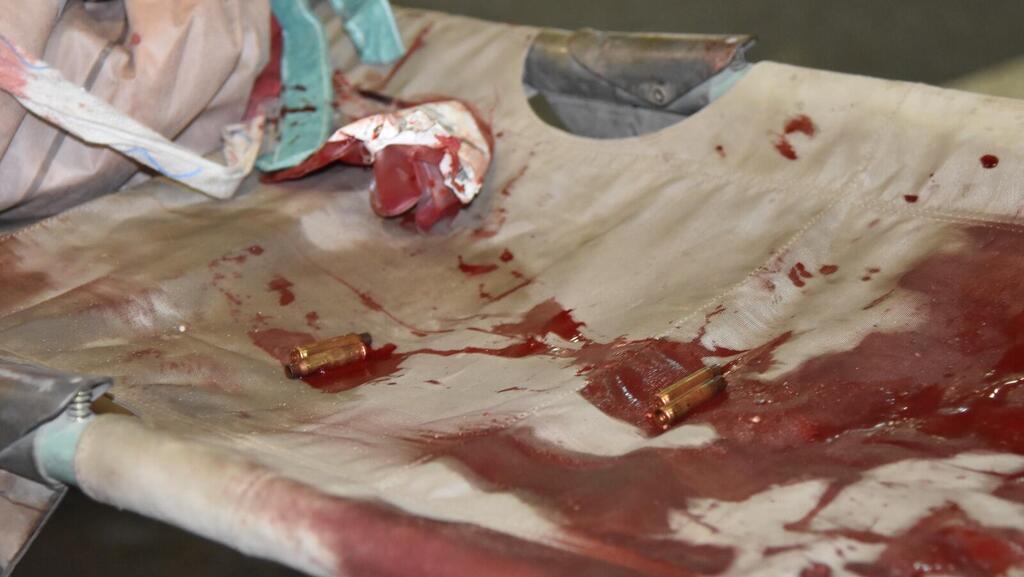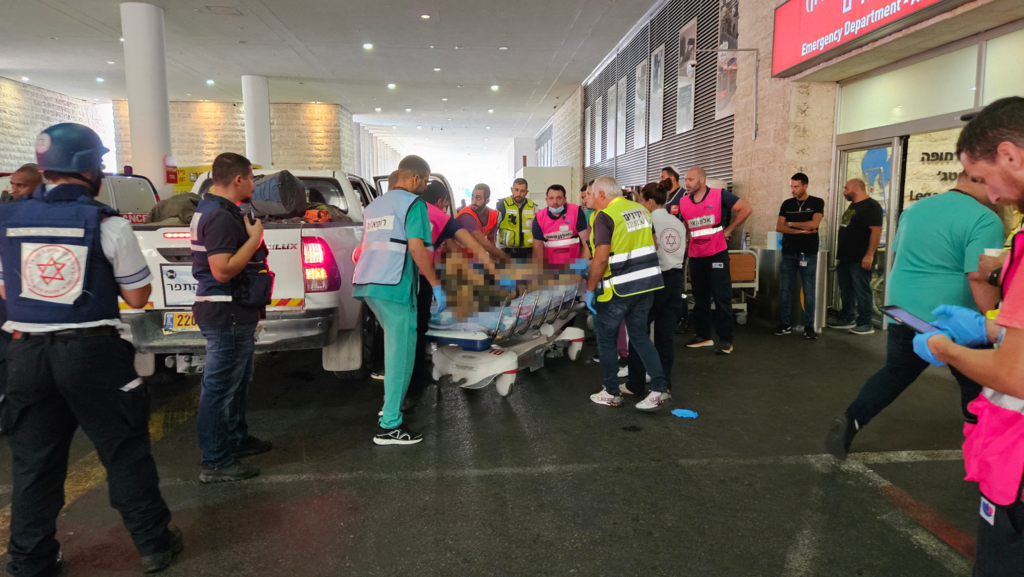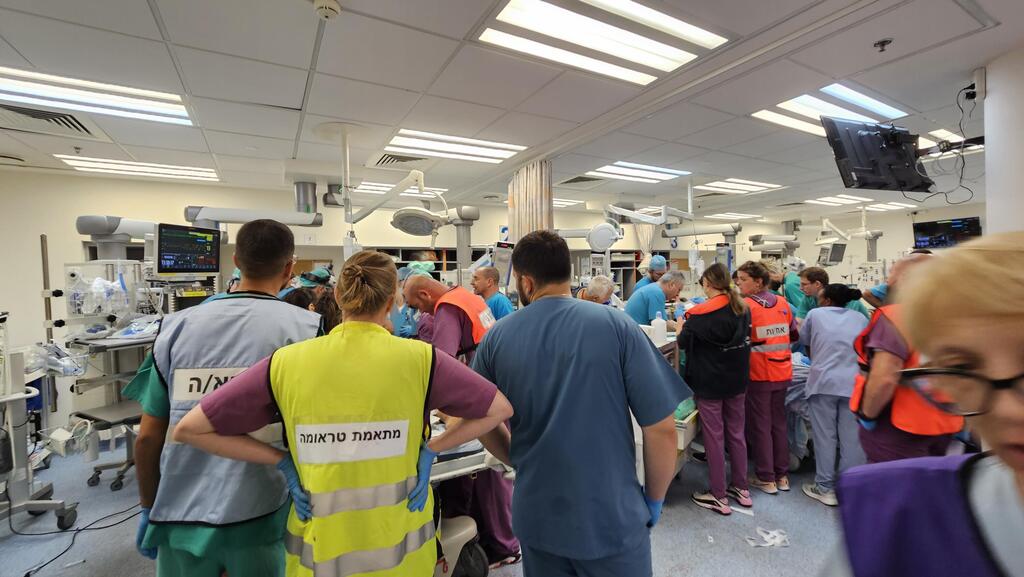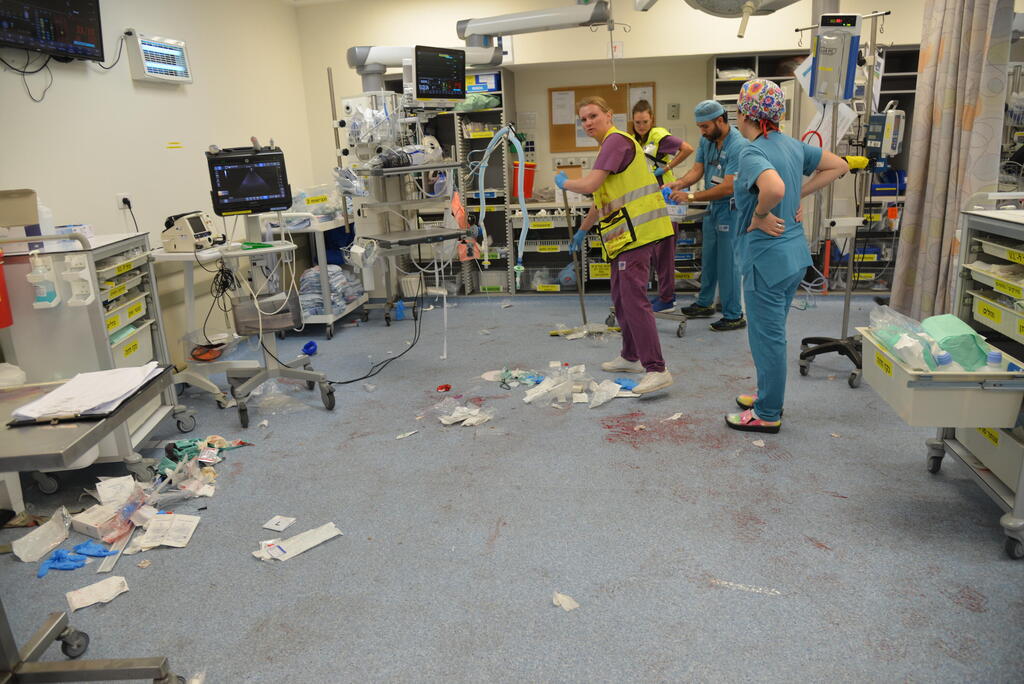Barzilai Hospital, October 7: An unending stream of casualties
Dozens of stretchers soaked in blood and filled with bullet casings, syringe wrappers, empty IV bags on the floor, blue medical gloves, operating rooms working endlessly and morgue refrigerators filled to capacity. Some bodies were placed on the floor, covered with hospital sheets.
More stories:
On October 7, the Barzilai Medical Center received more than 370 wounded, and since then has treated over 3,300 injured. The hospital itself has been targeted by hundreds of rockets and suffers from a lack of protection in large parts of it, another dire outcome of the neglect of the Israeli health care system over the years.
4 View gallery


Blood-stained stretcher at the Barzilai Medical Center
(Photo: Barzilai Medical Center)
"When did I feel that we were on the verge of collapse? At 8:30 a.m. on that black Saturday, when dozens of security personnel and injured soldiers arrived at the hospital. Dozens of ambulances entered one after the other," recounts Professor Hazi Levi, director of Barzilai Medical Center, describing the drama at the hospital. "It was a real flood, the likes of which has not been seen in Israel before."
The flood of injured on October 7
The first injured, he says, were classified to be in serious and critical condition. "Within a short time, eight out of the nine fortified operating rooms were already filled, with time working against them; many staff members hurried to arrive from their homes – under endless missile fire and great fear of encountering terrorists – to reinforce the trauma and operating rooms," according to Levi.
“But by 9:30 a.m., as documented in our operations log, we could no longer keep up with this immense flow; we were overwhelmed, and this was only the first day," he said.
After initial treatment, and as their condition allowed, some of the wounded were transferred for further care to hospitals in central Israel.
Among the first doctors who hurried to the hospital was Dr. Omri Lubovsky, head of the hospital’s Department of Orthopedic Surgery. "October 7 started for me with a phone call at 7 a.m. from a resident finishing a night shift telling me about a patient rushed to surgery with a gunshot wound to the thigh," he recalls. “At that point, we send a message in the department's WhatsApp group saying something is happening, whoever can should come.”
Even before donning his medical scrubs, he went up to the surgical floor. "I discovered the scale of the event as I arrived at the Emergency Room and saw an unending stream of evacuated casualties from the Gaza Strip, in a way we've never seen before,” he describes.
4 View gallery


Barzilai Medical Center Emergency Room entrance on October 7
(Photo: Barzilai Medical Center)
From this moment, the primary and crucial task facing him was to prioritize his work, assess the condition of the casualties, and decide within minutes who would be treated and where. His years as a combat soldier and later as a combat medic contributed to the mindset that helped him take control of the situation and manage it.
"The initial action we took was wide, as we released all the tourniquets from the soldiers' limbs and replaced them with pressure bandages that allow proper blood supply to the limbs. Simultaneously, the injured underwent an evaluation of their condition, and next to each bed, there wasn’t the regular medical team, meaning teams for medicine, nursing and other issues, but only one orthopedic doctor, who had to recall the basic medical studies he learned, understand the situation, and make a quick treatment decision,"Lubovsky says.
'We constantly had to make hard decisions'
In this chaos, Lubovsky had to change priorities on the go, as a large number of casualties continued to flow into the hospital’s trauma room. In the eight operating rooms, injured in serious and critical condition were treated, with life-saving surgeries performed by various specialty teams.
"After the surgeons saved lives in emergency abdominal and chest surgeries, or a blood vessel specialist treated and sealed damaged arteries, an orthopedic doctor took charge, stabilized, operated and saved an arm or a leg. In all operating rooms, only emergency surgeries were performed in the early hours," he says.
In those first two hours, dozens of ambulances entered and exited the protected parking lot, filling the parking area completely. "We also had to evacuate many bodies, and it was very frustrating in those first two hours," according to Lubovsky.
"We constantly had to make tough and quick decisions, whom to operate on first, how to streamline the evacuation of patients to another hospital, all while some of the essential orthopedic equipment ran out quickly - for example, external fixation devices, that were vital and necessary, ran out rapidly, and we had to urgently request supplies from other hospitals in the central region and from the IDF’s Home Front Command," he explains.
Alongside the injured suffering from limb and internal organ injuries, soldiers who suffered eye injuries were directed to Barzilai Medical Center as well. Dr. Eyal Aloni, head of the hospital’s Department of Ophthalmology, recounts: "The main injuries we saw were a result of foreign bodies penetrating the eye as a result of exploding grenades or stone fragments and shrapnel, causing critical injuries that could lead to vision loss.
“At least three soldiers’ eyes were severely affected, underwent surgeries, and will have to undergo additional ones; it’s too early to determine if their vision was saved or not. In addition, soldiers who received blast injuries from RPG rockets and were blinded also arrived," he desdcribes.
Barzilai Medical Center serves 100,000 patients each year with only 557 hospital beds. It's not surprising to discover how the Israeli governments washed their hands of this, saving crucial budgets, especially for fortifications, and sent hospital directors - even in Israel’s south and north - to solicit donations themselves.
'Donors prefer to donate to hospitals in central Israel'
"It's inconceivable that a hospital so close to the southern border doesn't receive state funding for fortification costing millions, which I can't afford, and of all this happens after we were hit by a rocket on the fourth day of the war that caused serious damage to the hospital," says Levi.
The hospital's government budget, according to him, covers only a third of the construction and fortification costs for the hospital, and the remaining two-thirds are expected to come from donors. "But donors prefer to donate to large hospitals in central Israel, wanting their name to show in Tel Aviv over Ashkelon. Therefore, I had to buy life-saving equipment using my limited budget, not given to me by the state," according to Levi.
"Due to the war, organizations and visitors from around the world arrive here and donate to us, but it's not enough,” he says. “To them, and many others, I’m an ambassador for Israel, presenting a country seen as evil. As a country whose soldiers bomb hospitals while we were bombed ourselves. There’s an asymmetry here."
Unlike Levi, Lubovsky expresses his frustration clearly. "In the early hours of the war, a soldier with a bleeding artery arrives who urgently needs to be taken to the operating room, but I don’t have one. Just like I don't have an X-ray technician, respirators, beds, and manpower," he says.
“This critical shortage affects our operations and prevents surgeries. My frustration is profound," the doctor adds, "and this overwhelming incident needs to be investigated at the level of state management as well, because there’s a lack of thinking ahead, and it's time to consider hospitals in Israel’s periphery as well."






